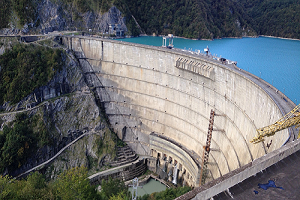Keeping the Adversary’s Lights on: Enguri Dam and Electricity Politics in Georgia
By Theresa Sabonis-Helf
March 13, 2017, the CACI Analyst
The critical but aging Georgian hydropower facility of Enguri is currently closed and under inspection, likely in urgent need of repairs. The facility serves both Georgia and Abkhazia, with portions of the facility located in each territory. Existing agreements compel Georgia to keep the lights on in Abkhazia – for free – in return for Abkhazia's (and Russia's) continued acknowledgement Georgia as the owner and operator of the facility. With Abkhaz consumption continuing to rise, Georgia is increasingly questioning how much it should be willing to do in order to maintain control of its largest power plant.

EU–China trade to bolster security in the South Caucasus
By Boris Ajeganov
January 23, 2017, the CACI Analyst
Foreign investment in Georgia is strengthening the country’s importance in connecting East Asia with Europe, which has positive implications for the broader region. The rise in FDI in commercial and transportation infrastructure in combination with the signing of international free trade agreements will reduce Georgia’s vulnerability in terms of economic and, ultimately, ‘hard’ security. The growing importance of the South Caucasus as node for EU-China trade will weaken Russia’s incentives to undermine its southern neighbors by military, political, and economic means as it has done in the past. Accordingly, Tbilisi’s ability to conduct an independent foreign policy is set to improve despite the absence of Western security guarantees.
Advancing Georgian-U.S. security cooperation after the Trump transition
By Richard Weitz
January 19th 2017, the CACI Analyst
The Trump administration will soon undertake a comprehensive review of Russia-US relations and U.S. policy toward the rest of Eurasia. Although the new team will presumably consider many options, the president-elect’s statements imply that the U.S. will not soon support further NATO expansion or other actions that would strongly antagonize Moscow. Despite this limitation, the U.S. government will continue security ties with U.S. partners in Eurasia, such as Georgia. In practice, there are a number of steps the U.S. and Georgia can undertake to advance their mutual security.
China deepens its presence in Georgia via its “One Road, One Belt” initiative
By John C. K. Daly
December 12th, 2016, The CACI Analyst
On October 2, China and Georgia signed a preliminary free trade agreement (FTA), scheduled to take effect from the end of 2017, China’s first substantive FTA negotiations in Eurasia. The FTA’s 17 sections include trade goods, services, intellectual property rights and emerging issues like e-commerce, with the two parties agreeing to remove all tariffs for most of the two nations’ commodity trade, as well as pledging to open many service sector markets and improve bilateral trade laws while identifying key areas for enhancing cooperation.
Reasons for cautious optimism as post-election dust settles in Georgia
By George Tsereteli
December 8th, 2016, The CACI Analyst
Despite the negative political discourse, pessimism and apathy shown by a historically low voter turnout in Georgia’s parliamentary elections in October, there are tangible reasons to be cautiously optimistic. When compared to other post-Soviet nations, Georgia is far ahead in terms of many economic and governance indicators. The main question moving ahead is how the ruling Georgian Dream (GD) party will use its newly-gained supermajority in parliament. The hope is that the ruling party will lead in an inclusive and non-unilateral way – respecting opposition viewpoints – while enacting responsible policies and reforms.







